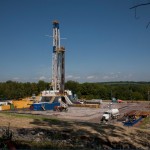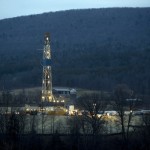Why Irish farmers should be deeply concerned about fracking
The governments in the Republic of Ireland (RoI) and Northern Ireland (NI) are undertaking an assessment of the possibilities for fracking on the island of Ireland and we await the results of that study. In the meantime we know enough about what is happening in the United States to be on the alert for some clear risks from fracking.
Here are some issues that the farming community should be especially watchful of.
First, farmers share with other users of the land the generic concerns about fracking:
the risks of groundwater, surface water and air pollution from chemicals and methane leaking or discharging from various steps in the fracking operations;
the increase in dangers from truck traffic delivering toxic chemicals, enormous quantities of water, and removal of toxic wastewater or blowback waters on the narrow lanes and borrens of Leitrim and Fermanagh and elsewhere;
the threats to one’s quality of life from an industrialised world, dominated by tall stacks and lights and flares and noise all day and night, suddenly superimposed on a serene countryside that is used to turf fires, dim lights, and occasional sounds of sheep and cows.
The second reason Irish farmers, on both sides of the border, should be concerned about fracking is the competition for water resources. Fracking requires enormous amounts of water, estimated in New York’s assessment at 2.4 million gallons to 7.8 m gals [average of 3.6m gal] per well, not well pad. Water supplies in many parts of the island of Ireland are already under stress, and with climate change the stress will increase significantly. Climate change is expected to bring more rain in the winter, and more severe storms but less rain in the summer with serious dry spells. Dublin is already moving to drain water from the Shannon watershed (the same areas where fracking is to occur?) to supply the east of Ireland. As the industry in the UK has admitted, “… where water is in short supply there may not be enough available from public water supplies or the environment to meet the requirements for hydraulic fracturing.” Or if the frackers are allowed to use the limited water, others will not, including farmers. Water can be trucked in for fracking operations, but that is costly, and aggravates an already stressed road system and quality of life.
Thirdly, there is only so much methane that Ireland (or Northern Ireland) will be allowed to emit in light of EU GHG-reduction obligations. On both sides of the border, about a third of GHG emissions come from farming. Yet on both sides of the border, the governments plan on expanding the dairy farming sector to seize the opportunities from the EU elimination of the dairy quotas in 2015, and many, but not all, farmers are cautiously embracing the expansion. There’s only so much room in the natural and legal atmosphere for methane and the more methane emitted from fracking, the less room is available for farmers.
Something or someone is going to have to give.
Sources:
Fiona Harvey, “Water shortages may make fracking impractical, industry says,” The Guardian (27 Nov 2013). www.theguardian.com/environment/2013/nov/27/water-shortages-fracking-impractical-uk/print
David Roberts’ “Ten reasons why fracking for dirty oil in California is a stupid idea,” Grist (18 March 2013). grist.org/climate-energy/top-10-reasons-why-fracking-for-dirty-oil-in-california-is-a-stupid-idea/
“Fracking in New York: accidents, spills, releases, ETC,” Reports section of irish environment (January 2012). www.irishenvironment.com/reports/fracking-in-new-york/




No comments yet, add your own below